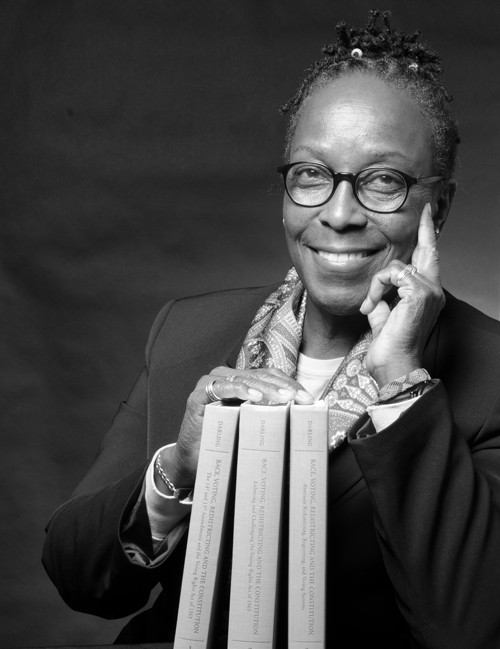
Adelphi professor publishes important but little-known truths.
The African American experience has often been minimized, misrepresented or even omitted completely from works of history—a scholarly act that continues to negatively shape societal attitudes and assumptions today. Marsha J. Tyson Darling, PhD, professor of history and interdisciplinary studies and director of Adelphi’s African, Black and Caribbean Studies program, is hard at work challenging conventional histories that contribute to the ongoing marginalization of African Americans.
“The most glaring misconception about all African Americans is that, with the exception of a few heroes, they have accomplished very little through their own agency,” Dr. Darling explained. This attitude not only attributes the marginalization of African Americans to their own passivity rather than systemic oppression—it also erases the rich history of African American activism and advocacy across the United States. “That’s the fallacy embedded in the dominant narrative taught to millions of Americans,” she said.
To expose that fallacy, Dr. Darling published three chapters in Africana Studies: A Survey of Africa and the African Diaspora that each seek to reframe a different aspect of African American history. “I sought to advance knowledge about African American historical experiences by adding relatively little-known—but important—perspectives and sources of information and critical analyses,” she said.

Marsha J. Tyson Darling, PhD, conducts research on national and international social justice movements. She is focusing increasingly on emerging biotechnologies and the public policy, social development and ethical issues they present.
In the first chapter, “Diaspora Africans and Slavery,” co-authored with Raymond Gavins, PhD, of Duke University, Dr. Darling examines the historical forces that led to the forcible removal of millions of Africans from their homeland. She highlights the enduring importance of the Doctrine of Discovery, “a body of beliefs, papal decrees, ways of thinking about nonwhite Christians and economic decisions that advanced the premise that all non-European lands, peoples and the natural resources they possessed were to be subdued, enslaved and rendered ‘property.'” Dr. Darling argues that this doctrine remains embedded in America’s legal system, and that understanding its role in forming the Atlantic economy and institutions of white supremacy is essential to the fight for equality.
“The Quest for Equality: From Reconstruction to Obama,” Dr. Darling’s second chapter, traces African American activist movements over the past 150 years. The most common historical accounts focus on white allies, erasing the efforts of countless influential African American activists. But, as Dr. Darling makes clear, African American activism yielded generations of African American state and federal legislative representatives, the overturning of Jim Crow, and the passing of the Voting Rights Act—all of which paved the way for President Barack Obama’s successful ascent to the White House.
In the final chapter, “Lifting as We Rise: Women in America,” Dr. Darling turns her eyes to the ways that gender has shaped the lived experience of African Americans. “It is not possible to speak of African American history without also delineating Black women’s experiences,” she said. In addition, Dr. Darling describes how the “burden of intersecting racism and sexism especially disadvantages low-income African American women,” offering a multidimensional perspective that dismantles the myth of a uniform African American historical experience.
Dr. Darling’s fight against false historical narratives also extends to her on-campus activities. She successfully led Adelphi’s request to host a Truth, Racial Healing & Transformation (TRHT) Campus Center, a national initiative from the W.K. Kellogg Foundation that aims to eradicate deeply rooted racial biases. Dr. Darling envisions the center as a platform through which the University—one of only two dozen institutions nationwide selected to participate in the initiative—can partner meaningfully with on-campus and local communities. “Critical, respectful dialogues must take place at every level to engage students, faculty, staff and administrators, as well as many of the residents, in the broader community, in activities that promote racial healing,” she said. “We must begin to build the trust that is necessary to confront, investigate and heal fromour community’s history of racialization and exclusion.”
Darling, Marsha J. Tyson. “Diaspora Africans and Slavery” (co-author Raymond Gavins), “The Quest for Equality: From Reconstruction to Obama,” and “Lifting as We Rise: Women in America.” Africana Studies: A Survey of Africa and the African Diaspora, edited by Mario J. Azevedo, Fourth Edition, Carolina Academic Press, 2019, pp. 93-122, 141-180, and 619-656.